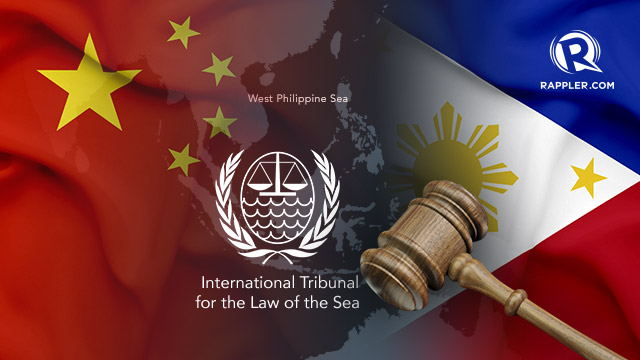SUMMARY
This is AI generated summarization, which may have errors. For context, always refer to the full article.

MANILA, Philippines – Turning the tables on China in their latest word war, the Philippines on Thursday, July 18, said the rising superpower has “no choice” but to subject itself to international law to show it is “a responsible nation.”
“To be accepted as a responsible nation, China has no choice,” said Department of Foreign Affairs (DFA) spokesman Raul Hernandez in a statement on the two countries’ dispute over the West Philippine Sea (South China Sea).
“It must show to the international community its respect for the rule of law, including the mechanism of arbitration, which is being pursued by the Philippines to clearly define respective maritime entitlements in the South China Sea,” Hernandez said.
The DFA spokesman made these statements in reaction to his Chinese counterpart, Hua Chunying, who hit the Philippines for supposedly changing its “attitude and approach” toward their territorial row.
It is the Philippines’ second statement in its latest exchange with China, which began after the Chinese Foreign Ministry accused the DFA of lying in Belgium about their dispute.
The DFA on Monday, July 15, already released an 8-point statement to belie the Chinese Foreign Ministry’s claims.
Their exchange comes as the designated arbitral tribunal, last July 11, began to hear Manila’s case against Beijing.
‘China can end this’
In his statement on Thursday, Hernandez added there is one way to end the maritime dispute between the two countries.
“China can end this South China Sea dispute by defining what the core issue is. China claims indisputable sovereignty over nearly all of the South China Sea through its 9-dash line claim, which is an excessive claim that is in gross violation of international law,” Hernandez said.
He noted this “is the core issue” stressed by Foreign Secretary Albert del Rosario in the Association of Southeast Asian Nations (ASEAN) meetings in Brunei.
In those meetings, “testy exchanges” reportedly ensued between Del Rosario and his Chinese counterpart, Wang Yi. Del Rosario did not deny this.
China, however, has consistently rejected arbitration to settle the West Philippine Sea dispute. It has instead pushed for bilateral negotiations, something that the Arroyo administration resorted to but failed, as far as the Aquino administration is concerned.
Key to success
Since China has objected to arbitration, how then can the Philippines succeed in this process?
In a paper on the West Philippine Sea row, researchers from the University of the Philippines (UP) said the Philippines can bring the dispute before an international tribunal “if the other concerned state/s agree to do so.”
“The success of the arbitration thus depends upon whether or not the arbitral tribunal will find that China impliedly and validly consented to the arbitration previously” upon its ratification of the United Nations Convention on the Law of the Sea (UNCLOS), according to a primer by UP’s Aileen Baviera and Jay Batongbacal.
“This could have major implications on the future of the SCS disputes, because to date none of the other States parties to the dispute have been similarly inclined to expressly submit themselves to the jurisdiction of an international tribunal,” Baviera and Batongbacal said in the primer published by the UP Asian Center and the newly established UP Institute of Maritime Affairs and Law of the Sea.
The Palace, for its part, on Thursday asserted it has “legal basis” to bring its case before the International Tribunal for the Law of the Sea.
Presidential spokesman Edwin Lacierda, however, said the Philippines’ relationship with China “is multifaceted” and involves factors like culture and trade.
“Our relationship with China should not be on the basis of this particular situation that we are confronted with right now,” Lacierda said. – Rappler.com
Add a comment
How does this make you feel?
There are no comments yet. Add your comment to start the conversation.